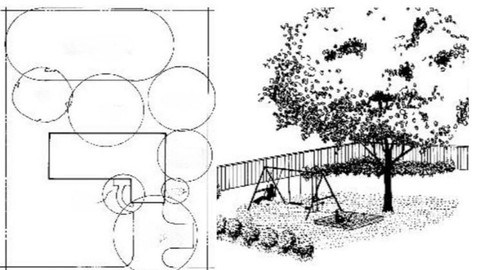
Principle of landscaping design
Principle of landscaping design, available at $49.99, has an average rating of 5, with 8 lectures, 3 quizzes, based on 2 reviews, and has 11 subscribers.
You will learn about landscaping introduction history of landscaping landscaping steps the design Installation Maintenance Ornamental plants and their diseases This course is ideal for individuals who are Aspiring landscape designers, architects, and students in related fields. It is particularly useful for Aspiring landscape designers, architects, and students in related fields.
Enroll now: Principle of landscaping design
Summary
Title: Principle of landscaping design
Price: $49.99
Average Rating: 5
Number of Lectures: 8
Number of Quizzes: 3
Number of Published Lectures: 8
Number of Published Quizzes: 3
Number of Curriculum Items: 11
Number of Published Curriculum Objects: 11
Original Price: $19.99
Quality Status: approved
Status: Live
What You Will Learn
- landscaping introduction
- history of landscaping
- landscaping steps
- the design
- Installation
- Maintenance
- Ornamental plants and their diseases
Who Should Attend
- Aspiring landscape designers, architects, and students in related fields.
Target Audiences
- Aspiring landscape designers, architects, and students in related fields.
A landscaping design course is a comprehensive exploration of the principles and techniques involved in creating visually stunning and functional outdoor spaces. This course revolves around the fundamental principle of harmonizing the art of design with the science of planning to transform open areas into aesthetically pleasing and purposeful environments.
At its core, the course introduces students to the essential elements of design, including lines, shapes, colors, textures, and forms. Students learn how to strategically manipulate these elements to achieve balance, rhythm, and focal points within a landscape. Emphasis is placed on the principles of unity and variety, guiding students to create cohesive and visually appealing designs that engage the senses.
Spatial planning is a key aspect of the curriculum, teaching students how to analyze and organize outdoor spaces effectively. This involves considerations such as circulation patterns, zoning, and the thoughtful integration of natural and built elements. Sustainable design practices are integral, covering concepts like water conservation, energy efficiency, and the use of native plants, instilling a sense of environmental responsibility in landscaping.
The course delves into plant selection and horticulture, providing students with knowledge about the characteristics, maintenance, and aesthetic considerations of various plant species. This botanical expertise is crucial for designing lush and thriving gardens that complement the overall landscape. Practical aspects of construction and installation, including hardscaping elements such as pathways and patios, are typically included to ensure students develop a well-rounded skill set.
In addition, technology plays a significant role in modern landscaping, with students often introduced to computer-aided design tools and software for precise planning and visualization. Communication skills are also emphasized, as professionals in the field collaborate with clients, architects, and contractors.
Overall, a landscaping design course provides students with a solid foundation in the principles, practices, and skills needed to transform outdoor spaces into visually stunning, sustainable, and functional works of art that harmonize with the natural environment.
Course Curriculum
Chapter 1: Introduction
Lecture 1: Introduction
Chapter 2: landscape history
Lecture 1: landscaping design history
Chapter 3: projects types
Lecture 1: gardens types
Chapter 4: Design
Lecture 1: design steps
Lecture 2: landscaping materials
Lecture 3: design systems
Lecture 4: plants material and colors
Chapter 5: Installation
Lecture 1: installation
Instructors
-
Ghaid Harairy
Agriculture engineer-plant production and protection
Rating Distribution
- 1 stars: 0 votes
- 2 stars: 0 votes
- 3 stars: 0 votes
- 4 stars: 0 votes
- 5 stars: 2 votes
Frequently Asked Questions
How long do I have access to the course materials?
You can view and review the lecture materials indefinitely, like an on-demand channel.
Can I take my courses with me wherever I go?
Definitely! If you have an internet connection, courses on Udemy are available on any device at any time. If you don’t have an internet connection, some instructors also let their students download course lectures. That’s up to the instructor though, so make sure you get on their good side!
You may also like
- Top 10 Video Editing Courses to Learn in November 2024
- Top 10 Music Production Courses to Learn in November 2024
- Top 10 Animation Courses to Learn in November 2024
- Top 10 Digital Illustration Courses to Learn in November 2024
- Top 10 Renewable Energy Courses to Learn in November 2024
- Top 10 Sustainable Living Courses to Learn in November 2024
- Top 10 Ethical AI Courses to Learn in November 2024
- Top 10 Cybersecurity Fundamentals Courses to Learn in November 2024
- Top 10 Smart Home Technology Courses to Learn in November 2024
- Top 10 Holistic Health Courses to Learn in November 2024
- Top 10 Nutrition And Diet Planning Courses to Learn in November 2024
- Top 10 Yoga Instruction Courses to Learn in November 2024
- Top 10 Stress Management Courses to Learn in November 2024
- Top 10 Mindfulness Meditation Courses to Learn in November 2024
- Top 10 Life Coaching Courses to Learn in November 2024
- Top 10 Career Development Courses to Learn in November 2024
- Top 10 Relationship Building Courses to Learn in November 2024
- Top 10 Parenting Skills Courses to Learn in November 2024
- Top 10 Home Improvement Courses to Learn in November 2024
- Top 10 Gardening Courses to Learn in November 2024





















